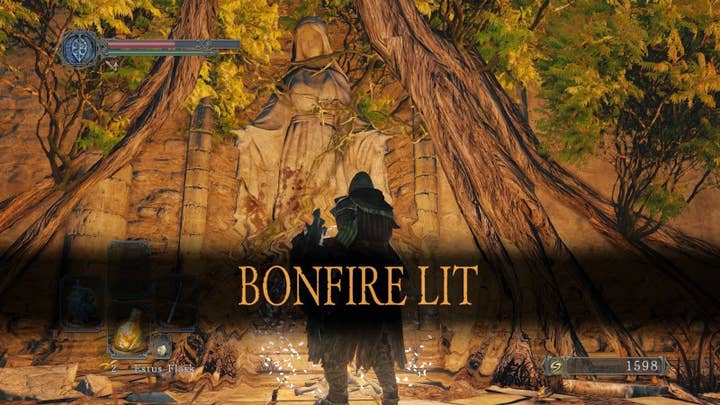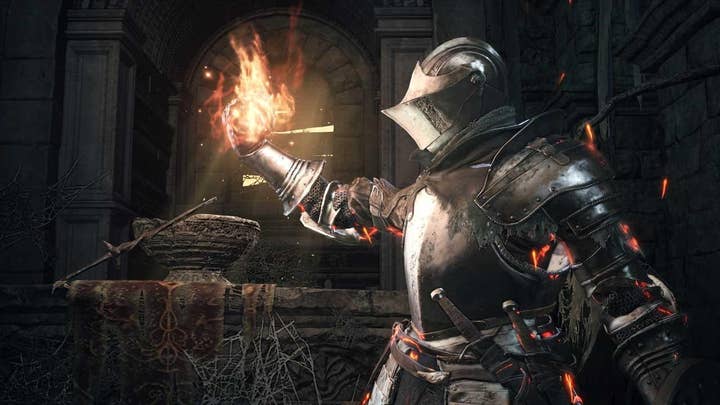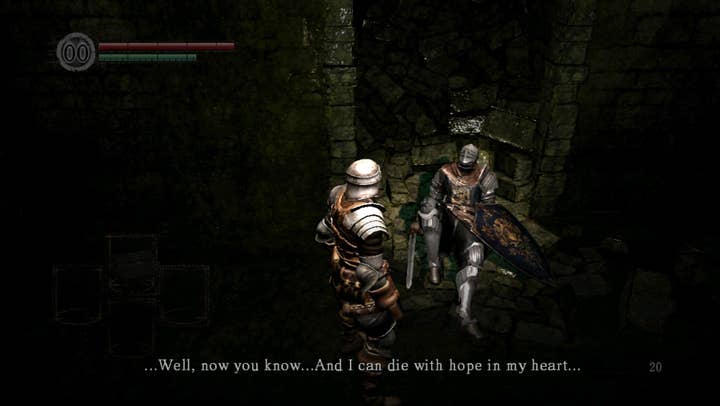What makes Dark Souls work?
Why I Love: Over the Moon's John Warner examines how From Software's modern classic invites players to make themselves at home
Why I Love is a series of guest editorials on GamesIndustry.biz intended to showcase the ways in which game developers appreciate each other's work. This entry was contributed by John Warner, founder of Over the Moon Studios, developers of The Fall franchise.
Playing Dark Souls is very much like moving into a new apartment. See what I mean? No? Okay... perhaps not... but give me a minute here. If you've played The Fall, or the recently released The Fall Part 2: Unbound, you'll guess that we here at Over The Moon like analysing shit. So, as you can imagine, me finding Dark Souls was quite an experience, as if my inner dog had discovered an endless field of daisies where it could just run, and run, and run.
I've become a bit fixated on why Dark Souls has such a strong spell over me, and I believe it's found ways to connect with some pretty deep layers of our psychology. So today, I want to sing its praises by illustrating that point and how much we (or I, at least) have to learn from it. Also quick caveat - this is not an exhaustive theory of why "everyone should like Dark Souls." There are lots of reasons for not liking Dark Souls. However, this is, I think, some of the reason why it does work, when it works!
If you've played Dark Souls, you'll likely understand the following experience: You show up in a new area where you're ambushed and otherwise killed repeatedly. Often, in order to progress, you need to create a fairly sophisticated mental map of the area - where the enemies are, what order to kill them in, what can be avoided, what can not be avoided, etc. After a while, you begin to obtain mastery over the area you're in; your initially trepidatious traversal of the space becomes an easy second-nature waltz. Dark Souls fans: could you not, right now, draw many sections from memory? I could probably draw the whole damn map at this point.

Also, doesn't it feel good to come back to an area that you once experienced as nigh impossible, only to be able to breeze through it now? This type of mastery comes from "knowing," in a complete sense, the various areas of Dark Souls. You've brought your consciousness to every little corner and as a result, you now master it. Almost like you're bringing light to darkness, or you could say lighting bonfires in… Wait, I'm getting ahead of myself.

Remember the last time you moved into a new home? There's an initial period where your new space is unfamiliar; it's not quite "home" yet. How do you make it your home? Well, you explore it, and spend time there. You come to know it: every corner of it. You make sure it's clean - and also in a metaphysical sense, that there's nothing hiding in the corners to jump out and bite you, so to speak. Coming to know your home in this way creates a sense of mastery over it; it's what makes it your home. I think that this is a deeply human, possibly hardwired way in which we relate to the world.
There are some patterns in video games that overlay quite nicely on fundamental core processes in our minds. We really like it when that happens, and that shouldn't be a contentious statement - obviously if we find games fun, they must interface with how we think and function. Additionally, I believe that if a game is congruent enough with how we think on enough levels, it becomes meaningful to us. Usually, "meaning" in our industry either refers to story with plot and theme, or some kind of player insight related to a consequence of the gameplay systems, such as in this fantastic story.
I suspect that Dark Souls brings forward a new sort of meaning, which you could describe as a representation of behaviour in gameplay systems. Contrast this against storytelling. People have been watching each other since before recorded history (probably), and telling stories about who we are and how we act. Those stories are like partial representations of our behaviour, and we yearn to watch, listen, and learn. A good story, you could argue, is one that you can relate to. It connects with a part of you. It shows you your behaviour, or the behaviour of the world. Video games can represent behaviour more directly, and underline it with a dash of story for added effect, but the principle is the same. What exactly are you acting out when you play a game you like? How deep and human is the behaviour that the gameplay fundamentally abstracts?
Consider the main behaviour in Dark Souls. You venture into the darkness and chaos of an almost entirely lost and destroyed civilization and as you do so, you come to know every corner of the world and expand your mastery over a long forgotten domain. Dark Souls has distilled this feeling by paralleling it on many levels:
- Combat gameplay has this experience, as this article has pointed out.
- Bonfires are literally a mechanic of bringing light and warmth to a dark cold world, and allow you to magnify your sense of mastery over your domain via instant transport.
- Lore is structured in an identical way; it's entirely opaque and requires the same sort of exploration.
- This is all underlined by the central goal. Once you have fully mastered your domain, you get to choose what becomes of it. Will you rekindle civilization or let it burn out?

There are other ways of looking at Dark Souls, but this is, I think, the fundamental mechanism at the core of "the Dark Souls drama," if you'd like... and there's a lot on top of it. How can I win? Who am I fighting? Why has the world fallen into disrepair? Why has it not been upkept? What the hell am I supposed to do? What does all of this mean? There's only one way to find out: come to know the world. Shine your consciousness on every part of it, and as a result, you become the one who can rekindle everything. You're like the avatar of civilization, at least if you pick that path. This is not a new idea. If I had to guess (I'm still only part way through Jung), this is probably an ancient archetype that's rooted at the base of our minds.
Dark Souls isn't the only thing that creates experiences like this. However, I admire it because of its purity. In lots of ways, it's operating very "close to the metal" to use a programming analogy for our psyche. It's not hollow and superficial because it's not propagandistic. It has connected with and dug out a piece of who we are; good art can show us who we are, and Dark Souls, in my opinion, is good art.

Upcoming Why I Love columns:
- Tuesday, June 19 - Infinite State Games' Mike Daw on Bubble Bobble
- Tuesday, July 3 - Infinite State Games' Charlie Scott-Skinner on Monster Hunter
- Tuesday, July 17 - The Trailer Farm's Dan Porter on Uncharted 4: A Thief's End
- Tuesday, July 31 - The Trailer Farm's Tony Porter on Halo:Combat Evolved
Developers interested in contributing their own Why I Love column are encouraged to reach out to us at news@gamesindustry.biz.